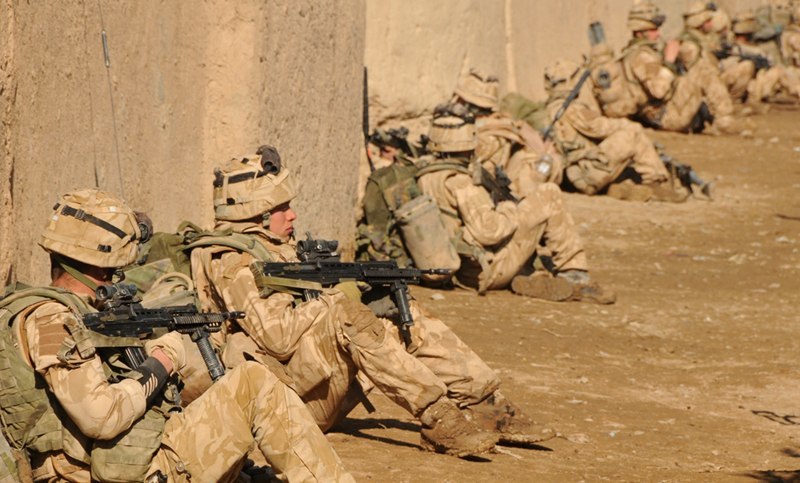Royal Marines from 45 Commando, Arbroath, injured several civilians during a tour of Afghanistan, according to leaked documents.
Details of the incidents, which included the shootings of a 12-year-old boy and a mentally ill man, were among over 90,000 files obtained by the WikiLeaks whistleblowing website.
The files mostly relate to US personnel, but some information about British units is included.
From November 2006 to November 2009 21 incidents relating to civilians dying or being injured as a result of actions by British forces are listed.
The marines spent six months in Helmand province in late 2008 and early 2009. During that time nine of their comrades were killed, mostly by improvised explosive devices.
They were among the more than 320 British personnel who have died in Afghanistan.
The documents portray the dangers 45 Commando faced during patrols, the swift decisions they had to make and their actions to defend themselves-sometimes with unfortunate consequences for civilians.
The earliest report is from October 14, 2008, when members of Y Company were manning a vehicle control point and a motorcyclist approached and ignored signals to stop.
A warning shot was fired into the ground, but it ricocheted and hit him in the foot.
The casualty was taken to a forward operating base (FOB) where he was assessed by a medic, then given money for a taxi and sent to hospital.Possible spotterThe next month W Company were conducting a reassurance patrol and saw someone they thought could be a spotter, who would give information on their location to insurgents.
A warning shot was fired but the report states, “Possible insurgent ignored the warning shot and followed the patrol.”
The marines “believed he was a threat to life” and engaged him again.
An update later states, “This was a local national, not an insurgent” and adds that the man was treated and sent to a local hospital.
At the end of December W Company were carrying out a patrol when a white van was spotted travelling at high speed towards a cordon.
The marines “gave verbal warnings and hand signals to the driver and he did not stop.”
A warning shot was fired and the van stopped, but the report notes, “A 12-year-old male passenger was wounded from a ricochet.”
On January 19, 2009, men from Y Company were about to be attacked by three insurgents. They were being given air cover by a Reaper drone, which fired a Hellfire missile.
The report notes, “The engagement was on target. Two explosions were observed immediately after the Hellfire attack.”Children’s shrapnel woundsLater, two children were brought to an FOB by their father. Both had shrapnel wounds to the abdomen and were treated by a medic.
The report states, “[The father] claimed he was in the bazaar when he was approached by some other children from his village, who told him that his children had been injured.
“On returning to his compound the children informed him that the Taliban had told them to leave the compound as they were going to use it as a firing post.”
A later update states that during this incident six insurgents were wounded and captured. One of them later died from his wounds.
The final event listed happened on March 26 last year and involved marines from W Company.
Two suspicious persons were seen observing a patrol. They were then joined by another two and a warning shot was fired, causing all four to flee.
The marines came across a man on a motorbike watching them from a canal path. A warning shot was fired and he failed to stop.
It was felt the man “posed an imminent threat” and he was shot.
However, a later update states, “Casualty is not a detainee. Casualty is on anti-psychotic meds” and it appears he was taken to hospital.
Photo used under Creative Commons licence courtesy of Flickr user isafmedia.
The incidents listed suggest that at least 26 civilians have been killed as a result of the actions of British forces, with more wounded.
Several deaths resulted from a Harrier bomber airstrike, while others happened at vehicle checkpoints or during attacks on suspected Taliban.
A Ministry of Defence spokesman said, “We are deeply saddened by any civilian deaths or injuries but we particularly regret incidents where civilians are killed as a result of actions by international forces.”
The man behind the release of the files said on Monday that he believed they could contain details of “thousands” of war crimes.
Julian Assange is the founder of the WikiLeaks website, which published the documents with newspapers in the UK, USA and Germany.
The reports contain day-by-day accounts of NATO operations over the six years to December 2009, revealing new details about the extent of civilian casualties, a covert special forces unit targeting insurgent leaders and concerns that Pakistani intelligence could support the Taliban.
Mr Assange said, “It is up to a court to decide clearly whether something is in the end a crime.
“That said, on the face of it, there does appear to be evidence of war crimes in this material.”
The UK, the US and Pakistan condemned the leak of the records and experts warned their release could endanger the 10,000 British forces serving in Afghanistan.
But Mr Assange insisted he had considered and ruled out that risk.
